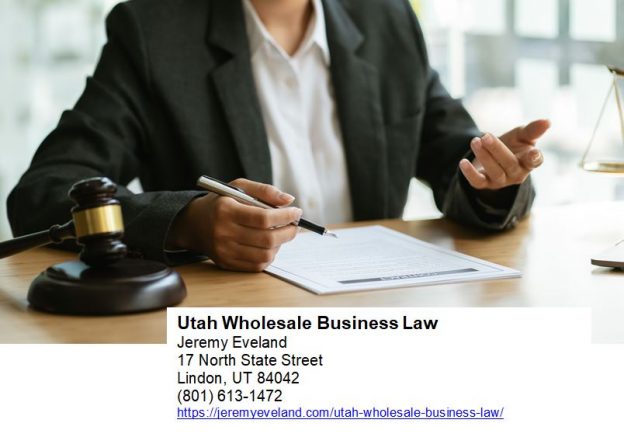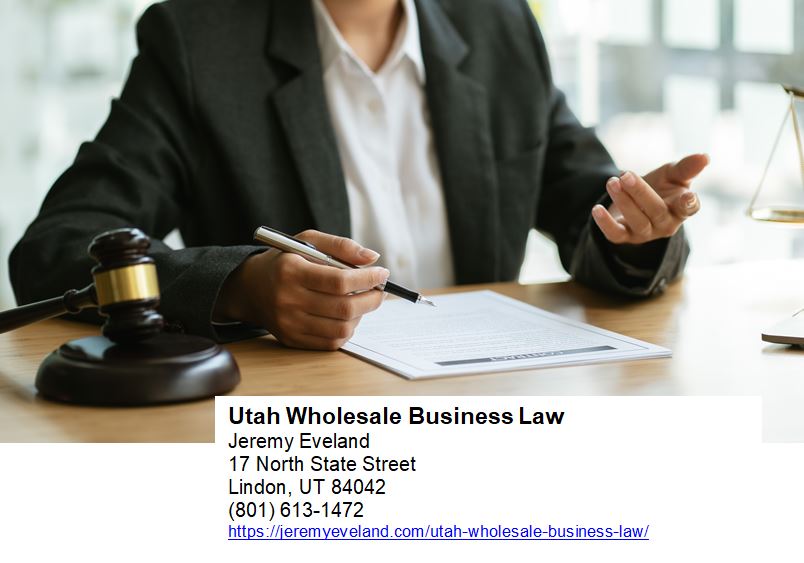Are you a business owner in Stansbury Park, Utah? Finding the right legal representation for your business is crucial to protect your interests and ensure compliance with the complex laws and regulations that govern the business world. In this article, we will explore the importance of hiring a business lawyer in Stansbury Park, Utah, and how their expertise can benefit your company. From contract negotiations to intellectual property protection, a skilled business lawyer can provide invaluable guidance and support for your business’s legal needs. Read on to discover why investing in a business lawyer is a smart move for any entrepreneur in Stansbury Park, Utah.
1. What is Business Law?
Business law refers to a set of legal rules and regulations that govern the formation, operation, and dissolution of businesses. It encompasses a wide range of legal issues that arise in the business world, including contract law, employment law, intellectual property law, tax law, and corporate law. Business law ensures that businesses operate within legal boundaries and helps protect the rights and interests of business owners, shareholders, employees, and customers.
2. Importance of a Business Lawyer
2.1 Protecting Your Business
A business lawyer plays a crucial role in protecting your business interests. They can help you navigate complex legal issues and provide legal advice to ensure that your business complies with applicable laws and regulations. Whether it is drafting legally sound contracts, protecting your intellectual property, or resolving disputes, a business lawyer can help safeguard your business from potential legal pitfalls.
2.2 Compliance with Laws and Regulations
Compliance with laws and regulations is essential for any business to operate smoothly and avoid legal troubles. A business lawyer can help you understand the legal requirements specific to your industry and ensure that your business is in full compliance. They can assist with obtaining necessary licenses and permits, drafting policies and procedures, and ensuring adherence to employment and labor laws.
2.3 Drafting and Reviewing Legal Documents
Businesses frequently deal with a variety of legal documents, including contracts, agreements, and leases. Having a business lawyer by your side ensures that these documents are properly drafted, reviewed, and negotiated to protect your interests. A business lawyer can identify potential risks, negotiate favorable terms, and ensure that the documents accurately reflect your intentions, helping to prevent future disputes.
2.4 Resolving Disputes
Disputes are an inevitable part of doing business. When conflicts arise, a business lawyer can help you navigate the legal system and assist in resolving disputes through negotiation, mediation, or litigation if necessary. They have the knowledge and expertise to protect your rights and interests, saving you time, money, and stress in the process.
2.5 Providing Expert Advice and Guidance
A business lawyer is a trusted advisor who can provide you with expert guidance throughout your business journey. They understand the complexities of business law and can provide valuable insight into various legal issues you may encounter. This advice can help you make informed decisions, mitigate risks, and maximize opportunities for your business’s success.

3. Finding the Right Business Lawyer
Finding the right business lawyer is crucial to ensure effective legal representation and protection for your business. Here are some essential steps to help you find the perfect match.
3.1 Identifying Your Business Needs
Before starting your search for a business lawyer, it’s important to assess your specific legal needs. Determine the areas of expertise you require assistance with, such as contract negotiation, intellectual property protection, or regulatory compliance. Clearly defining your needs will help you narrow down your search and find a lawyer who is experienced in handling your specific legal challenges.
3.2 Researching and Evaluating Potential Lawyers
Once you have identified your business needs, it’s time to start researching and evaluating potential lawyers. Seek recommendations from trusted sources, such as other business owners or professionals in your network. Additionally, use online resources, such as legal directories and review websites, to gather a list of potential candidates.
3.3 Checking Qualifications and Experience
When evaluating potential lawyers, it’s important to consider their qualifications and experience. Look for lawyers who specialize in business law and have a track record of successful outcomes. Check their educational background, professional certifications, and any notable achievements. A lawyer’s experience in handling cases similar to yours can provide valuable insight into their ability to handle your legal matters effectively.
3.4 Assessing Communication and Availability
Effective communication and accessibility are key factors in a successful attorney-client relationship. During initial consultations with potential lawyers, assess their communication style, responsiveness, and willingness to address your concerns. A lawyer who can communicate clearly, explain complex legal concepts in a way you understand, and promptly respond to your inquiries is essential for a smooth working relationship.
3.5 Consulting and Hiring the Lawyer
After conducting thorough research and evaluations, schedule consultations with the lawyers you are considering. Use these meetings to discuss your business needs, ask relevant questions, and assess the lawyer’s approach and compatibility with your business. Consider their professionalism, trustworthiness, and how well they understand your business goals. Once you have found the right lawyer, negotiate the terms of engagement and sign a retainer agreement to officially hire their services.
4. Common Business Legal Issues
Businesses encounter a variety of legal issues in their day-to-day operations. Understanding these common legal challenges can help you anticipate and address potential risks proactively.
4.1 Formation and Structure of Business Entities
Choosing the right legal structure for your business is a critical decision that impacts various aspects, including taxation, liability, and governance. A business lawyer can guide you through the process of forming a business entity, such as a corporation, limited liability company (LLC), or partnership, ensuring compliance with legal requirements and protecting your personal assets.
4.2 Contractual Matters
Contracts play a pivotal role in business transactions, partnerships, and employment relationships. A business lawyer can help draft, review, and negotiate contracts to protect your interests and ensure proper enforcement. They can also assist with contract disputes, breach of contract claims, and dispute resolution.
4.3 Intellectual Property Protection
Intellectual property (IP) rights, such as patents, trademarks, copyrights, and trade secrets, are valuable assets for businesses. A business lawyer can help you protect your IP through registration, licensing, and enforcement, safeguarding your creations and innovations from unauthorized use and infringement.
4.4 Employment and Labor Law
Employment and labor laws govern the relationship between employers and employees. They cover areas such as hiring practices, wage and hour regulations, workplace safety, discrimination, and termination. A business lawyer can ensure that your business complies with these laws and help address any employment-related disputes that may arise.
4.5 Business Transactions and Acquisitions
Mergers, acquisitions, joint ventures, and other business transactions involve complex legal processes and regulatory considerations. A business lawyer can guide you through these transactions, conduct due diligence, negotiate terms, and protect your interests, ensuring a smooth and legally compliant transaction.
4.6 Tax Planning and Compliance
Tax obligations are an integral part of running a business. A business lawyer with expertise in tax law can help you navigate the complexities of tax planning, minimize tax liabilities, and ensure compliance with tax laws and regulations. They can also assist in resolving any tax-related disputes with government authorities.
4.7 Regulatory Compliance
Businesses operate within a regulatory framework that is specific to their industry. Compliance with industry-specific regulations is crucial to avoid penalties and legal consequences. A business lawyer can help you understand and comply with these regulations, ensuring that your business operates lawfully and ethically.
4.8 Dispute Resolution and Litigation
Despite best efforts, disputes can arise in the course of business. A business lawyer can represent your business’s interests in dispute resolution processes, such as negotiation, mediation, or arbitration. If litigation becomes necessary, they can effectively advocate for your business in court, protecting your rights and pursuing a favorable resolution.
5. Benefits of Hiring a Business Lawyer
Hiring a business lawyer offers numerous benefits that can contribute to the success and growth of your business. Let’s explore some of the key advantages.
5.1 Minimizing Legal Risks
Business operations are fraught with legal risks. A business lawyer can help identify these risks, implement strategies to minimize exposure, and develop preventative measures to avoid legal issues in the first place. By addressing potential legal risks proactively, you can protect your business’s reputation, assets, and bottom line.
5.2 Avoiding Costly Mistakes
Lack of legal knowledge and expertise can lead to costly mistakes that can hinder your business’s growth and success. A business lawyer can provide guidance and advice to help you avoid these mistakes. They can review business decisions, contracts, and transactions to ensure legality and mitigate potential risks, ultimately saving you from expensive legal consequences.
5.3 Efficient Business Operations
By entrusting legal matters to a business lawyer, you can focus on running your business more efficiently. Delegating legal responsibilities to a professional allows you to allocate your time and resources effectively, knowing that your legal matters are in capable hands. This enhances productivity, streamlines operations, and enables you to concentrate on your core business activities.
5.4 Negotiating Favorable Terms
Negotiating contracts, agreements, and business deals can be daunting, particularly if you lack legal expertise. A business lawyer can level the playing field by advocating for your interests, negotiating favorable terms, and ensuring that any legal document accurately reflects your intentions. Their negotiation skills can help you secure better deals, protect your rights, and enhance your business’s prospects.
5.5 Peace of Mind
Running a business can be stressful, especially when legal issues arise. Hiring a business lawyer provides peace of mind, knowing that your legal matters are being handled by a professional. Their expertise, experience, and dedication to your business’s success give you the confidence to navigate legal challenges with ease, allowing you to focus on achieving your business goals.
6. Working with a Business Lawyer
A successful working relationship with your business lawyer is essential for effective legal representation. Here are some tips for establishing a strong attorney-client relationship.
6.1 Establishing a Strong Attorney-Client Relationship
Open and honest communication is vital in establishing a strong attorney-client relationship. Clearly communicate your expectations, goals, and concerns to your lawyer as early as possible. Trust and respect are crucial elements of this relationship, allowing your lawyer to understand your business and provide tailored legal advice.
6.2 Communication and Confidentiality
Maintaining open lines of communication with your business lawyer is essential. Ensure that you provide all relevant information, documents, and updates to your lawyer promptly. Additionally, discuss your preferred communication methods and frequency of updates to ensure a smooth workflow. Confidentiality is a cornerstone of the attorney-client relationship, and your lawyer has a legal obligation to keep all information you provide confidential.
6.3 Providing Necessary Documentation
Your business lawyer relies on accurate and complete documentation to effectively represent your interests. Be proactive in providing any requested documents, contracts, or financial records to your lawyer. Keeping your lawyer updated on any changes or developments in your business is also crucial to ensure that they have all the necessary information to provide you with the best legal advice.
6.4 Collaborating in Decision-Making
While your business lawyer is an expert in legal matters, remember that you are the decision-maker for your business. Collaborate with your lawyer in decision-making processes, carefully considering their advice and weighing it against your business priorities. By combining your business acumen with your lawyer’s legal expertise, you can make informed decisions that align with your business goals.
6.5 Regular Updates and Reporting
Maintain regular communication with your business lawyer to stay informed about the progress of ongoing legal matters. Request regular updates and reports to ensure that you are aware of any developments or changes that may impact your business. This allows you to stay actively involved and make timely decisions based on the most up-to-date information provided by your lawyer.

7. Business Lawyer Fees
Business lawyers typically charge fees based on various billing methods, depending on the nature and complexity of the legal services rendered. Here are some common billing methods used by business lawyers:
7.1 Hourly Rates
Many business lawyers charge an hourly rate for their services. With this billing method, you pay for the actual time spent by the lawyer on your legal matters. The hourly rate may vary based on the lawyer’s experience, location, and the complexity of the case.
7.2 Flat Fees
Flat fees are a predetermined, fixed amount that a lawyer charges for specific legal services. This method is commonly used for routine, well-defined legal tasks such as contract drafting or trademark registration. Flat fees provide transparency and predictability in terms of cost.
7.3 Contingency Fees
Contingency fees are commonly used in certain types of business litigation, such as personal injury or breach of contract cases. In this arrangement, the lawyer’s fee is contingent upon winning the case or obtaining a favorable settlement. The lawyer receives a percentage of the monetary award or settlement as their fee.
7.4 Retainer Fees
Some business lawyers may require a retainer fee, which is an upfront payment to secure their availability and services. The retainer fee is typically deposited into a client trust account and deducted as the lawyer bills for their services. Retainer fees help ensure priority access to the lawyer’s time and expertise.
7.5 Billing Methods
Business lawyers may use a combination of billing methods based on the specific circumstances and legal services provided. It is important to discuss and clarify the billing method with your lawyer during the initial consultation so that you have a clear understanding of the anticipated costs.
8. Pros and Cons of DIY Business Law
While it may be tempting to handle business legal matters on your own, there are several drawbacks to consider. Here are some pros and cons of do-it-yourself (DIY) business law:
8.1 Cost Savings
One potential advantage of DIY business law is the potential cost savings. By handling legal matters yourself, you can avoid attorney fees. However, it is essential to weigh this potential cost savings against the risks and potential legal consequences of lacking legal expertise.
8.2 Lack of Expertise
Business law is a complex and ever-changing field that requires extensive knowledge and expertise. Attempting to navigate the legal landscape without proper understanding can result in costly mistakes and legal disputes. A business lawyer brings specialized knowledge and experience to ensure your legal matters are handled correctly.
8.3 Increased Legal Risks
DIY business law can increase your exposure to legal risks. Without proper legal guidance, you may overlook important legal requirements, fail to protect your assets adequately, or enter into unfavorable contracts. This can leave your business vulnerable to legal disputes, regulatory penalties, and other complications.
8.4 Time and Effort
Handling legal matters yourself requires significant time and effort. As a business owner, your time is valuable, and attempting to master the intricacies of business law can detract from focusing on your core business activities. Hiring a business lawyer allows you to delegate legal responsibilities and devote your time to growing and managing your business.
8.5 Limited Legal Resources
DIY business law often means relying on generic templates, online resources, or advice from non-legal professionals. While these resources may have some value, they cannot provide the personalized legal advice and tailored solutions that a business lawyer can offer. DIY approaches may overlook crucial legal considerations and fail to address your unique business needs.

9. Frequently Asked Questions
9.1 What is the role of a business lawyer?
A business lawyer’s role is to provide legal advice and representation to businesses in various legal matters. They help protect and advance their clients’ business interests by assisting with contract drafting and negotiation, ensuring compliance with regulations, resolving disputes, and providing guidance on legal risks and opportunities.
9.2 When should I hire a business lawyer?
It is advisable to hire a business lawyer as soon as you start your business or anticipate legal issues. A business lawyer can help with entity formation, contract drafting, intellectual property protection, compliance, and any other legal matters you may encounter. Proactive legal counsel can prevent potential legal problems and position your business for long-term success.
9.3 What documents should a business lawyer review?
A business lawyer can review a wide range of legal documents to protect your interests. This may include contracts, agreements, leases, employment contracts, partnership or shareholder agreements, financing documents, and compliance policies, among others. Consulting a business lawyer for a comprehensive review ensures that these documents are legally sound and tailored to your specific needs.
9.4 How much do business lawyers charge?
The fees charged by business lawyers vary based on several factors, including the lawyer’s experience, the complexity of the case, and the billing method used. Hourly rates, flat fees, contingency fees, retainer fees, or a combination of these methods may be used. It is important to discuss the fee structure with your lawyer during the initial consultation to have a clear understanding of the expected costs.
9.5 Can I handle business legal matters on my own?
While it is possible to handle some basic legal matters on your own, it is not recommended for complex or high-stakes legal issues. Business law is intricate, and a mistake or oversight can have significant consequences for your business. By hiring a business lawyer, you can benefit from their legal expertise, minimize legal risks, and ensure that your business is fully protected.
10. Conclusion
Navigating the complex world of business law is essential for the success and protection of your business. With the ever-changing legal landscape and the multitude of legal challenges that businesses face, having a knowledgeable and experienced business lawyer by your side is crucial. From protecting your business to ensuring compliance, resolving disputes, and providing expert advice, a business lawyer is an invaluable asset in navigating the legal complexities of owning and operating a business. Take the time to find the right business lawyer who understands your specific needs and goals, and make the investment in legal counsel to secure the future of your business.
If you need an attorney in Utah, you can call for free consultation:
Jeremy Eveland
8833 South Redwood Road
West Jordan, Utah 84088
(801) 613-1472
https://jeremyeveland.com

